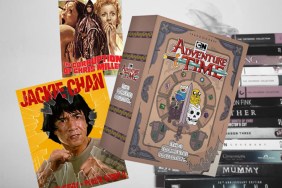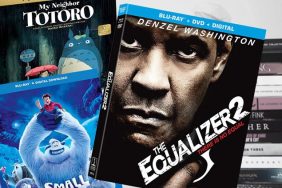
I only discovered Jackie Chan when Hollywood brought his movies over dubbed, but I thought Rumble in the Bronx was the awesomest thing I’d ever seen. I didn’t care about the story. It fit my “because it’s awesome” rule. Everything about the cushion and the diamonds and the street punks was fine because Jackie Chan was doing awesome stuff. I even liked his American debut The Big Brawl, but understood The Protector was the danger of what Hollywood would do to Jackie Chan: stifle him.
I thought Shanghai Noon was the first American movie to really understand Jackie Chan. I liked Rush Hour fine but it was a compromise between who he was and what Americans needed. He could be a little awesome, but not too awesome or people would lose patience. More distressingly, the Rush Hour movies basically make fun of Chan, which kind of appeals to our most xenophobic nature. It’s in the guise of buddy cop banter, but really it’s “Hey, look at that Asian guy! He doesn’t understand black slang!”
Pairing Chan with Owen Wilson was a bit gentler than Chris Tucker, and not quite as lucrative but successful enough for a sequel, and now this double feature Blu-ray. Chon Wang (Chan) journeys to the American west to rescue a kidnapped princess (Lucy Liu). When his uncle is killed, he teams up with cowboy Roy O’Bannon (Wilson) to rescue her and avenge his uncle.

There is still a bit of racial humor, because Roy mistakes Chon Wang for John Wayne, but it’s more of a riff on movie westerns. This relationship makes Chon the hero, because Roy is just a whiny cheating coward who needs Chon to rescue him. The mismatched buddies and fish out of water are nothing new, but they’re endearing and entertaining here.
The action is still mild compared to Chan’s gonzo Hong Kong work, but when they let him fight, he finds ways to work his magic into the brief encounters. In a riverside fight against two Native Americans, Chan finds blissfully creative uses for bushes, branches and trees. The bar fight is full of Chan’s trademark prop work and the finale lets Chon battle some other Chinese guards, so he can get some of his stunt team in to do real martial arts.
I was super excited for Shanghai Knights to fully embrace Chan now that he had two successful Hollywood franchises. I ended up liking Knights a little less, and there are a number of changes to the series that could explain that. They had a different director, David Dobkin instead of Tom Dey. More notably, they changed locations so the charm of Jackie Chan in the old west was replaced by something arguably less charming.

Chan had dreamed of playing a cowboy in a movie, and the high concept script of Shanghai Noon is probably the only way he was ever going to be allowed to do that in a Hollywood that was no longer making westerns anyway. I’m sure he gave his all to Knights too but it’s missing a spark.
This time Chon and Roy go to London to pursue the murderers of Chon’s father. First of all, that’s a bummer. His uncle died in Shanghai Noon and now his father. It’s a good thing there was no third movie or the entire Chon family would be wiped out! Additionally, aside from the clever pun, Jackie Chan and Owen Wilson as Victorian era knights isn’t that funny or exciting. By the way, that’s Kick-Ass himself, Aaron Taylor-Johnson as the precocious kid who keeps harassing Chon and Roy in London.
There are still plenty of fight scenes, still briefer than we all know they could be if Chan was really given the freedom. In fact, the DVD deleted scenes contain two extended fight scenes. There’s a beautiful chase sequence that ends with Chan basically doing Singin’ in the Rain. Or, rather, non-legally binding generic umbrella dance. There are moments in the revolving door fight and the library fight that reach great crescendos but then drop the energy immediately. I noticed the music in Knights seems more Mickey Mousey, as if they had to be sure to tell you that Chan’s fighting style was comic and you shouldn’t take it seriously. It’s obtrusive. Randy Edelman did both scores so I don’t know why they’d be drastically different. Maybe the western motif just blended better.

It seems the focus in Knights was more calling out famous London locations. Look, they’re on Big Ben! I found the Statue of Liberty fight in Around the World in 80 Days more organic, and that’s not a backhanded compliment. 80 Days is a way underrated Jackie Chan movie. Sammo Hung’s in it as Wong Fei-Hung. They got that into a Disney movie! But back to Knights, I like the fight in the scaffolding of Big Ben, but once they have the actors green screened onto a landmark for a “stunt” derivative of Safety Last, which Chan already did for real in Project A, it’s less of an environmental gag and more of a gimmick. Most disappointingly, Donnie Yen plays the villain’s henchman and the confrontation with Chan is underserved as those fights are hastily intercut with all the other story threads resolving at the same time.
The Blu-ray transfers of both of these films are okay. They’re maybe not top tier restoration quality titles so you’ll see some digital noise creep in, particularly in the more dimly lit London sequel’s moonlight climax. The films still look sharp and clear though, especially the widescreen western vistas of Noon. Knights isn’t quite as colorful but there are more recognizable sights that you can see in HD detail, or locations CGIed to look like their historical counterparts.
All the bonus features from both movies’ original DVD releases are included, so most importantly that means the extended fight scenes on Shanghai Knights. The full library fight is a Jackie Chan masterpiece. It plays much better without the musical score and with the standard definition low-res rough cut footage, it actually looks like watching a Hong Kong movie back in the day. We get a more satisfying Chan vs. Yen fight, and you get to really appreciate how they constructed it to include the sort of ground fighting Yen likes. The extended Madame Tussaud’s fight actually just has more Owen Wilson.

It reminds me of when The Matrix introduced wirework to American audiences. Everyone loved it. It was amazing how characters in the matrix could defy physics and gravity. Then other American movies started using wirework, like the Jet Li/DMX films, and people rejected it. I actually heard people say, “Wait a minute, you’re not in the matrix so you can’t do those moves.” I tried to explain to them that every movie is a matrix. It’s all make believe so they can defy physics. Of course you have to establish the world of the film but if you’re not going for gritty realism you don’t have to restrict yourself to reality just because there’s no robots or brain jacks. Don’t you want to see Jet Li do those awesome wire flips? You’d rather he not defy gravity because it’s not “realistic” and they haven’t justified it as a computer simulation?
Yes, that’s what American audiences want. So we have both. In Hong Kong they were doing wirework for decades in historical movies, modern day cop movies and wacky comedies. They don’t care why the awesome happens as long as it’s awesome. They also have really broad standards for comic relief but that’s another story. I personally responded to the Hong Kong aesthetic and gravitate towards Chan’s pure movies. I will continue to love Hong Kong, and now Thai movies, where they just pour on the awesome. It is nice to see him work in English and with some production values though. The Shanghai movies are still the closest Hollywood has come to a true Jackie Chan movie, but I’ll still see Rush Hour 4 and hopefully one day Shanghai Dawn in which Chon Wang must avenge his entire family tree.

Fred Topel is a staff writer at CraveOnline and the man behind Shelf Space Weekly. Follow him on Twitter at @FredTopel.








